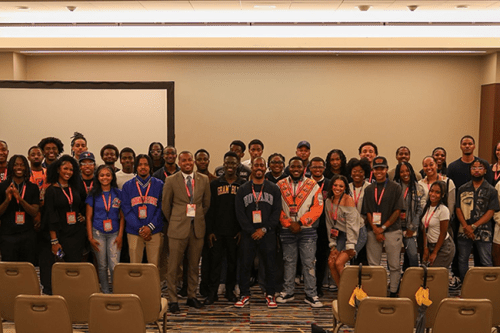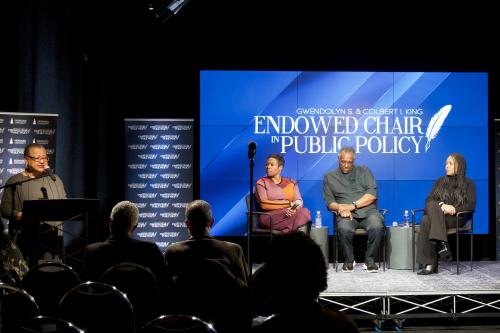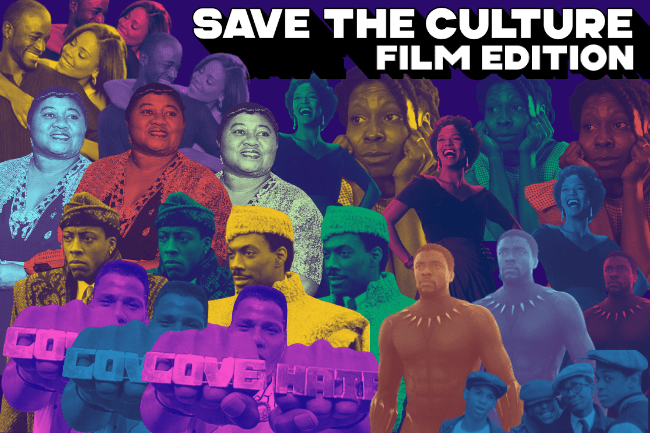Remember when time capsules were a thing?
For the uninitiated, groups of people nationwide would accrue the items they felt best represented their era, stow said items in a container of some sort, and hide said container to be one day discovered by future generations as evidence of how we once did things on planet Earth.
Think of our SAVE THE CULTURE series as a modernized version of the time capsule. In 2025, a quarter of the way into this pivotal century and nearly 100 years since the iconic Harlem Renaissance — an era that profoundly shaped Black artistic expression and cultural identity — this project feels especially urgent. There is no doubt that many people feel that there are very deliberate attempts by some to erase the contributions of Blacks from history. Whether those sentiments are unfortunate misperceptions or turn out to very legitimate based on very real actions, we felt the need to do our part to ensure that the legacy of Black influence on global culture never fades.
Throughout the summer and fall, our editorial team will be highlighting elements of culture essential to understanding the Black American experience, in genres ranging from film and television to music and literature, and so much more in-between. By spotlighting landmark cultural creativity, we aim not only to preserve and honor the rich legacy of Black culture, but also to inspire ongoing dialogue, foster greater appreciation, and provide future generations with a vibrant record of how our culture thrived at this defining moment in history.
African American cinema has both shaped and reflected the struggles, triumphs, aspirations, and cultural vitality of Black life in the United States. From challenging systemic racism and reshaping societal perceptions to illuminating authentic narratives and empowering future generations, these films have represented profound and pivotal landmarks in cinematic history.
As part of our SAVE THE CULTURE series, we have selected 20 of the most essential films since the medium’s invention early in the 20th century. Each film merits inclusion in this cinematic time capsule not only for its artistic achievements but also for its lasting impact on Black culture and broader conversations about race, identity, and representation. Many feature Black actors in leading roles, Black directors and producers, or make important statements about the experiences of descendants of the African diaspora using drama, comedy, and commentary to entertain, educate, and raise awareness.
With support from Jami Ramberan, MFA (J.R.) — an associate professor in the Cathy Hughes School of Communications (CHSOC) and assistant chair of the Department of Media, Journalism, and Film — we explain why these motion pictures have persisted over time and will continue to have relevance in the next century. The following collection highlights essential movies whose cultural and historical significance transcends their eras.
Within Our Gates | 1920 | directed by Oscar Micheaux
Oscar Micheaux’s groundbreaking response to racist portrayals in early cinema, “Within Our Gates” is foundational to Black filmmaking. Tackling lynching, racial violence, and educational access, this film courageously confronted the realities of Black life in America, laying a critical groundwork for future Black storytellers and activists in film.
“Oscar Micheaux’s ‘Within Our Gates,’ released in direct response to D. W. Griffith’s ‘The Birth of a Nation,’ confronted racism, lynching, and the reality of Black life in America with unflinching honesty. At a time when Hollywood was spreading white supremacist propaganda, Micheaux used cinema to fight back with truth and dignity. It’s not just historic, being the oldest surviving feature film written, directed and produced by an African-American — it’s revolutionary.” – J.R.
"Within Our Gates" was conserved by the Library of Congress and can be streamed for free.
Gone with the Wind | 1939 | directed by Victor Fleming
Though controversial, “Gone with the Wind” remains historically crucial in understanding how mainstream Hollywood perpetuated harmful stereotypes of African Americans.
Hattie McDaniel’s historic Oscar victory amidst these problematic portrayals sparked essential dialogue about representation, racism, and the evolving Black presence in Hollywood cinema.
Carmen Jones | 1954 | directed by Otto Preminger
A landmark musical, “Carmen Jones” powerfully showcased Black talent through Dorothy Dandridge and Harry Belafonte (D.H.L. '01), redefining Black representation in classic Hollywood. Its success challenged prevailing racial barriers and proved Black actors could lead successful films, while bringing sophisticated storytelling and visibility to Black artistry.
“‘Carmen Jones’ broke barriers with its all-Black cast and bold reimagining of a classic love story. Dorothy Dandridge’s magnetic performance made her the first Black woman nominated for a Best Actress Oscar, paving the way for future generations. At a time when Hollywood limited Black roles, this film gave audiences complex, passionate characters and showcased Black excellence on a grand, glamorous scale. It’s a cinematic milestone that still resonates today.” – J.R.
A Raisin in the Sun | 1961 | directed by Daniel Petrie
This adaptation of Lorraine Hansberry’s acclaimed play gave voice to Black aspirations and struggles in America, delivering an authentic, dignified portrayal of a Black family’s pursuit of the American dream.
It emphasized the importance of self-determination and racial pride, marking a significant moment in cinema and theater alike.
Putney Swope | 1969 | directed by Robert Downey Sr.
An audacious, satirical critique of race relations and corporate America, Robert Downey Sr.’s film offered radical commentary on Black empowerment and representation in media.
Its unapologetic examination of racial stereotypes and capitalism set a precedent for confronting social injustice through biting humor and innovation in film.
Super Fly | 1972 | directed by Gordon Parks Jr.
Emblematic of the “Blaxploitation” era, “Super Fly” embodied both the challenges and rebellious spirit of Black urban America.
Curtis Mayfield’s iconic soundtrack amplified Black creativity and social critique, leaving an indelible mark on Black music and cinema, reflecting cultural defiance against systemic limitations.
Cooley High | 1975 | directed by Michael Schultz
Celebrating the vibrancy and complexity of Black teenage life, "Cooley High" resonated through humor, heartache, and friendship. Its poignant depiction of inner-city youth offered a realistic narrative that influenced subsequent generations of Black coming-of-age films and filmmakers.
“‘Cooley High’ captures the complexity of Black teenage life with truth, nuance and compassion, offering an authentic look at Black youth beyond the stereotypes found in mainstream film. Its genuine storytelling and emotional depth paved the way for Black coming-of-age stories that came after its release, replicating Cooley’s High’s portrayal of Black teen life with humanity, humor, and honesty.” – J.R.
"Cooley High" can be streamed on Tubi for free.
The Color Purple | 1985 | directed by Steven Spielberg
The initial cinematic adaptation of Alice Walker’s novel spotlighted Black women’s resilience and agency amid profound trauma. The film underscored complex familial and societal dynamics, becoming pivotal in shaping discourse around race, gender, and empowerment within African American narratives.
“Steven Spielberg’s adaptation of Alice Walker’s ‘The Color Purple’ serves as a landmark in cinematic representations of Black womanhood with themes of resilience, self-discovery, and liberation in the face of generational trauma, systemic racism, and patriarchal oppression. The adaptation draws deeply from Walker’s source material and performances rooted in lived cultural experience, lending the film a powerful sense of emotional authenticity. It expanded the visibility of Black female narratives within mainstream cinema and contributed meaningfully to broader cultural and scholarly conversations around race, gender, sexuality, and empowerment in African American life.” – J.R.
Coming to America | 1988 | directed by John Landis
A joyous celebration of Black excellence, culture, and comedic brilliance, Eddie Murphy’s “Coming to America” challenged mainstream depictions of Africa and the diaspora.
It remains culturally beloved, proving Black-led comedy could achieve global popularity while reshaping narratives of wealth and identity.
Do the Right Thing | 1989 | directed by Spike Lee
Spike Lee’s powerful exploration of racial tensions exploded myths around post-racial America, holding an unflinching mirror to systemic racism and police brutality. With enduring relevance, it sparked vital discussions and activism, solidifying its place as essential viewing in Black cultural and cinematic history.
“‘Do the Right Thing’ remains reflective of America’s present, the film captures the volatile intersection of race, community, and policing. As tensions boil over, the outcome feels heartbreakingly familiar: an act of police violence, followed by civil unrest mirroring the real-life tragedies of Michael Stewart, Eric Garner, George Floyd, and others whose lives were taken in similar fashion. Even in 2025, the parallels are undeniable. Spike Lee’s bold cinematic warning reminds us that racism is not only personal but structural. Its enduring relevance lies not only in its artistic brilliance but in its urgent reflection of the systems that still shape our society today.” – J.R.
Boyz n the Hood | 1991 | directed by John Singleton
John Singleton’s seminal portrayal of South Central Los Angeles gave authentic visibility to systemic violence, racial inequality, and familial strength.
A critical catalyst for new Black cinema, it amplified urgent societal conversations and empowered future generations of Black filmmakers and storytellers.
Belly | 1998 | directed by Hype Williams
Hype Williams’ visually distinctive film captured hip-hop culture and Black urban life in the late ’90s. Through its raw depiction of ambition and morality, "Belly" became a cultural touchstone, marrying music video aesthetics with cinema to influence subsequent portrayals of Black identity.
“‘Belly’ holds a significant place in Black cinema for its innovative visual style and its inclusion of hip-hop culture. Directed by Hype Williams, one of the most prolific music video directors of our time, the film marked a critical intersection between music video aesthetics and narrative filmmaking. Williams’ visual language profoundly shapes representations of Black identity in popular media through the stylized portrayal of urban life, masculinity, and moral reckoning. It stands as a culturally resonant text — offering insight into the complexities of Black expression, media representation, and the aesthetics of hip-hop.” – J.R.
Brown Sugar | 2002 | directed by Rick Famuyiwa
Highlighting Black love through the lens of hip-hop culture, "Brown Sugar" celebrated Black relationships, authenticity, and artistic integrity.
Its heartfelt narrative offered refreshing perspectives on love and friendship, enriching the landscape of contemporary Black romantic cinema.
Ray | 2004 | directed by Taylor Hackford
Jamie Foxx’s Oscar-winning portrayal of Ray Charles honored the complexities and brilliance of a Black musical legend.
The film spotlighted the profound contributions of African Americans to global culture, reinforcing Black genius and resilience against adversity.
Moonlight | 2016 | directed by Barry Jenkins
Barry Jenkins’ poetic masterpiece centered Black queer identity, vulnerability, and masculinity with unprecedented nuance. "Moonlight’s" groundbreaking Best Picture Oscar win underscored the need for diverse storytelling, elevating overlooked narratives of Black experience and emotional depth.
“‘Moonlight’ is a groundbreaking film that redefined Black cinema by telling an intimate and poetic story about identity, masculinity and love through the lens of a queer Black boy becoming a man. Barry Jenkins’ direction, paired with breathtaking visuals and performances, created a landmark moment in film history that centers Black life with tenderness and depth, solidifying it as a cinematic masterpiece in storytelling and representation.” – J.R.
Get Out | 2017 | directed by Jordan Peele
Jordan Peele’s groundbreaking horror-satire revolutionized genre cinema by confronting insidious racism and white liberal complicity head-on.
Its cultural resonance profoundly shifted conversations around race, power, and Black representation, marking a transformative moment for socially conscious storytelling.
Black Panther | 2018 | directed by Ryan Coogler
An unprecedented cultural phenomenon, Ryan Coogler’s "Black Panther" redefined global perceptions of Black heroism, excellence, and African identity.
Empowering audiences through Afrofuturistic imagination, it permanently elevated Black representation in blockbuster cinema, inspiring pride and creative possibilities for generations.
Judas and the Black Messiah | 2021 | directed by Shaka King
This gripping dramatization of Fred Hampton’s life powerfully illuminated the struggles of Black revolutionaries against systemic oppression. It reignited important discussions about Black activism, state surveillance, and justice, securing its crucial place in both cinematic and cultural history.
“‘Judas and the Black Messiah’ reclaims the story and legacy of Fred Hampton and the Black Panther Party. The film blends historical truth with emotional intensity, offering a rare, nuanced portrayal of Black political resistance, brought to life by powerful performances. It’s not just a film — it’s a reckoning. Bold, urgent, and unapologetically Black, it redefines what revolutionary storytelling in cinema looks like.” – J.R.
American Fiction | 2023 | directed by Cord Jefferson
Sharply satirical yet deeply insightful, Cord Jefferson’s “American Fiction” offered a critical commentary on Black authenticity, publishing industry stereotypes, and cultural commodification. Its boldness in challenging conventional narratives reinforced its importance in conversations about representation and the complexities of Black intellectual life.
Sinners | 2025 | directed by Ryan Coogler
Forward-thinking and bold, “Sinners” confronts modern intersections of race, morality, and justice with striking nuance. Its innovative storytelling and compelling performances capture the evolving contours of Black experiences, marking a new chapter in socially engaged cinema and highlighting ongoing struggles for equity.
“‘Sinners’ is a genre-defying supernatural action thriller that operates on multiple levels—melding mystery, psychological tension, and mystical lore into an emotionally charged narrative. This is Coogler’s most imaginative departure yet, a character-rich story that allows him to explore new creative terrain. Rooted in the emotional resonance of blues music — what Coogler calls “the music that experience inspires”— ‘Sinners’ boldly confront themes of identity, corruption, and resilience. It marks not only an evolution in genre of storytelling, but also a culturally significant entry into modern Black cinema.” – J.R.
Keep Reading
-
 News
NewsFICO Invests in the Howard University and PNC Center for Entrepreneurship
Jan 28, 2026 3 minutes -
 Uplift
UpliftService, Scholarship, and the Dream in Action: Howard University Inspires the Next Generation on MLK Day
Jan 23, 2026 2 minutes -
 Epiphany
EpiphanyHoward University Hosts MLK Birthday Conversation on Leadership, Equity, and the Future of Learning
Jan 20, 2026 6 minutes
Find More Stories Like This
Are You a Member of the Media?
Our public relations team can connect you with faculty experts and answer questions about Howard University news and events.
Submit a Media Inquiry

